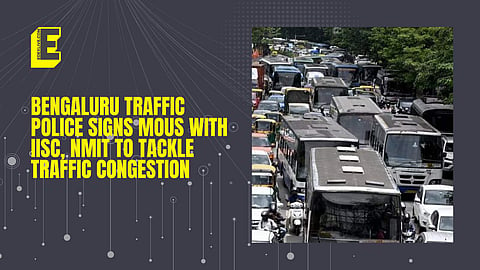

In two separate Memoranda of Understanding (MoUs) with the Indian Institute of Science (IISc) and the Nitte Meenakshi Institute of Technology (NMIT), the Bengaluru Traffic Police (BTP) agreed to share city traffic data, mitigate traffic congestion and enhance safety by implementing technology-centric and Artificial Intelligence (AI)-driven solutions.
This endeavour also aims to reduce air pollution in Bengaluru and increase the residents’ productivity, according to The New Indian Express.
According to MN Anucheth, Joint Commissioner of Police (Traffic), the city generates over 30 petabytes of data every month. From this underutilised data collected by the police, IISc aims to extract insights to address mobility and traffic safety challenges, as per the MoU.
“Additionally, we anticipate training and capacity building from IISc to empower our staff with knowledge for enhancing mobility and traffic safety,” he said.
The data from these joint efforts will aid in improving mobility and traffic safety, through even more research projects and tailored training programmes, says Professor Abdul Rawoof Pinjari, Chairman of the Centre for Infrastructure, Sustainable Transportation and Urban Planning (CiSTUP), IISc.
Using the traffic data provided by the BTP, IISc will conduct comprehensive analyses using the Information Technology Management System and other tools. This collaborative effort aims to raise awareness, enhance mobility and improve traffic safety, said Kuldeep Kumar Jain, District Commissioner of Police (Traffic) of the East zone.
The aim of the MoU with NMIT is to explore novel methods to ease congestion in the city, in order to reduce pollution and enhance the productivity of Bengalurians.
Monitoring, regulating, and identifying traffic law violators, as well as understanding the root causes of traffic and its problems are a few issues the initiative will address.
This collaborative effort will benefit NMIT students by providing internship opportunities and exposure to real-world situations. It will promote a dynamic learning environment by facilitating the exchange of academics, researchers, and professionals. According to NMIT, the initial focus will be on the use of drones and other technology.
“Bengaluru's traffic is not just a transportation problem, it's an economic and environmental one. By investing in technology, partnerships and innovative approaches, we can not only ease congestion but also boost productivity, reduce pollution, and improve the quality of life for all Bengalureans," Anucheth said.
